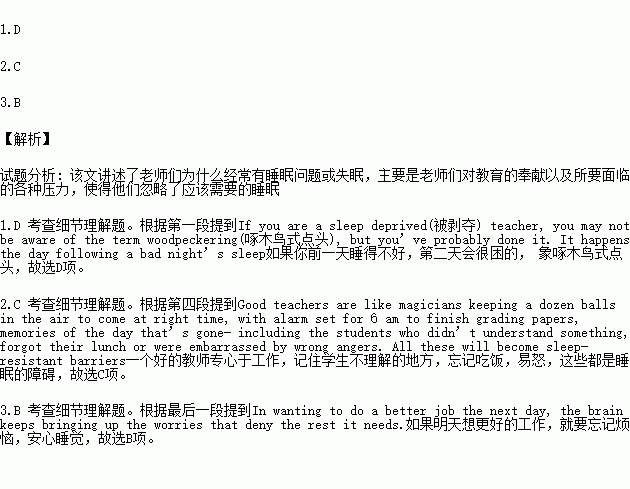题目内容
If you are a sleep deprived(被剥夺) teacher, you may not be aware of the term woodpeckering(啄木鸟式点头), but you’ve probably done it. It happens the day following a bad night’s sleep. You’re sitting in a long meeting and you can barely keep your eyes open, so you support your head up with your hand. Next thing you know, you are moving your sleeping head back to its upright position. Do this a few times and you are woodpeckering.
I thought I knew sleep deprivation when I did my medical internship in hospital. That year I frequently went 36 hours with no sleep. When I finished my stay in neurology(神经内科), I welcomed the promise of full nights of sleep ever after. It went pretty well for the next 10 years until I became a school teacher and experienced a whole new level of sleep deprivation.
Teachers’ working hours go far beyond the 8 am to 5 pm schedule of kids in school. There are hours spent at staff meetings, correcting homework, preparing for the next day and then there is the worrying. What I did in a hospital emergency room required no more intensive mental energy than what is need to keep 30 kids attentive enough to learn what I was teacher.
Good teachers are like magicians keeping a dozen balls in the air to come at right time, with alarm set for 6 am to finish grading papers, memories of the day that’s gone- including the students who didn’t understand something, forgot their lunch or were embarrassed by wrong angers. All these will become sleep-resistant barriers. And also with some financial stress, you’ll have a cycle of insomnia(失眠) with unwelcome consequences.
With inadequate sleep comes irritability(易怒), forgetfulness, lower tolerance of even minor annoyances, and less efficient organization and planning. These are the very mental muscles that teachers need to meet the challenges of the next day. In wanting to do a better job the next day, the brain keeps bringing up the worries that deny the rest it needs.
1.After a bad night’s sleep, usually the direct effect for the next day is to ______.
A. keep one’s eyes open all the time
B. move head back and forth
C. raise one’s head in upright position
D. keep nodding like a woodpecker
2.Good teachers’ sleep problems are mainly due to the _____.
A. common sleep-resistant barriers
B. embarrassment for wrong answers
C. diligence and devotion to teaching
D. misunderstanding of their students
3.What does the writer really want to tell us in the last paragraph?
A. Unfavorable effects of inadequate sleep are various
B. Lay down worries and sleep well first for the next day.
C. Teachers should often practice mental muscles.
D. Better job has nothing to do with inadequate sleep.
选词组填空
请根据下列句子从方框内选择适当的词组填入空白处。(有一个选项为多余项。)
in spite of opposed to anxious about appeal to a large number of a great deal of vary from … to let out make one’s way on behalf of exchange … for |
1.Here are one hundreds dresses of the latest style. Choose whichever _______ you.
2.Please allow me the honor, ___ my government, to extend warmest welcome to your visit.
3.In the center, children are exposed to different games, _______ simple __________ complex.
4.The travelers __ across deserts, through forests and finally to a beautiful valley, where they stopped to take a rest.
5.Anyone __ this plan should submit their reasons for going against it, or we’ll put it into practice soon.
6.I know you have ____ questions. Be patient, I’ll answer them one by one.
7.She put her own life at risk _____ my repeated warnings.
8.It won’t be necessary for you _____ RMB ___ foreign money when you travel abroad after RMB joins the SDR.
9.The fans were so excited to see the Hollywood star that they _______ screams.
10.__ her child’s safety, the young mother couldn’t fall asleep.

